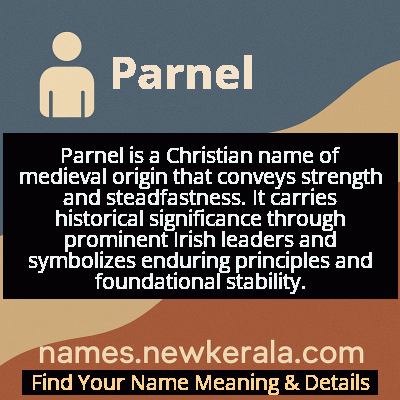Parnel Name Meaning & Details
Origin, Popularity, Numerology Analysis & Name Meaning of Parnel
Discover the origin, meaning, and cultural significance of the name PARNEL. Delve into its historical roots and explore the lasting impact it has had on communities and traditions.
Name
Parnel
Gender
Male
Origin
Christian
Lucky Number
3
Meaning of the Name - Parnel
Parnel is a Christian name of medieval origin that conveys strength and steadfastness. It carries historical significance through prominent Irish leaders and symbolizes enduring principles and foundational stability.
Parnel - Complete Numerology Analysis
Your Numerology Number
Based on Pythagorean Numerology System
Ruling Planet
Jupiter
Positive Nature
Optimistic, inspirational, and creative.
Negative Traits
Scattered, exaggerating.
Lucky Colours
Yellow, gold, purple.
Lucky Days
Thursday.
Lucky Stones
Yellow sapphire.
Harmony Numbers
1, 2, 9.
Best Suited Professions
Arts, writing, communication.
What People Like About You
Creativity, optimism.
Famous People Named Parnel
Sir John Parnell
Politician
Irish Chancellor of the Exchequer and prominent political figure in Irish Parliament
Charles Stewart Parnell
Political Leader
Irish nationalist politician who led the Home Rule Movement and became known as 'Ireland's Uncrowned King'
Thomas Parnell
Poet and Clergyman
Anglo-Irish poet and member of the Scriblerus Club, friend of Alexander Pope and Jonathan Swift
Henry Parnell
Politician and Economist
British politician and writer on financial matters, served as Paymaster of the Forces
Name Variations & International Equivalents
Click on blue names to explore their detailed meanings. Gray names with will be available soon.
Cultural & Historical Significance
In the 19th century, the name became indelibly linked with Irish nationalism through the Parnell family, particularly Charles Stewart Parnell, whose leadership of the Home Rule movement made him one of the most significant figures in modern Irish history. His political career and the controversies surrounding him—including his relationship with Katharine O'Shea and the subsequent split in the Irish Parliamentary Party—created a cultural legacy that transformed the name Parnel from a simple family name into a symbol of Irish political aspiration and complex leadership. The name continues to evoke this rich historical tapestry, connecting medieval Christian heritage with modern political struggle.
Extended Personality Analysis
Individuals named Parnel are typically associated with strong, principled personalities marked by intellectual depth and natural leadership abilities. The historical figures who bore this name, particularly in the Parnell family, demonstrated qualities of strategic thinking, political acumen, and the ability to inspire devoted followings. These traits suggest someone who is both visionary and practical, capable of developing long-term strategies while managing immediate challenges effectively.
Parnels are often perceived as serious, determined individuals with a strong moral compass and the courage to stand by their convictions even under significant pressure. The name's connection to 'rock' in its etymology further reinforces associations with reliability, steadfastness, and emotional resilience. These individuals tend to excel in positions requiring diplomacy, intellectual rigor, and the ability to navigate complex social or political landscapes. Their personality combines traditional values with innovative thinking, making them effective agents of change who respect heritage while pushing boundaries.
Modern Usage & Popularity
In contemporary naming practices, Parnel remains a relatively uncommon choice, primarily preserved within Irish families and communities with strong connections to Irish history. While its usage peaked in the late 19th and early 20th centuries following Charles Stewart Parnell's political prominence, the name has experienced a modest revival in recent decades as part of a broader trend toward historical and heritage names. Modern usage strongly favors the spelling 'Parnell' over 'Parnel,' and it continues to be used almost exclusively as a masculine name despite its origins as a feminine form. The name maintains its strongest presence in Ireland and among Irish diaspora communities, where it serves as a conscious connection to Irish political history and cultural identity. Its rarity in contemporary times gives it a distinctive quality that appeals to parents seeking traditional yet uncommon names with significant historical weight.
Symbolic & Spiritual Meanings
Symbolically, the name Parnel carries profound meanings rooted in both its etymology and historical associations. Drawing from its origin as a diminutive of Petronilla, which itself derives from Petrus (Peter), the name inherits the biblical symbolism of the 'rock'—representing stability, foundation, and unwavering faith. This Christian symbolism connects Parnel to ideas of spiritual strength and moral fortitude. Historically, the name has accumulated additional symbolic weight through its association with Irish political leadership and the Home Rule movement, representing national aspiration, political courage, and the complex interplay between personal conviction and public service. Metaphorically, Parnel suggests someone who serves as a cornerstone—essential, reliable, and foundational to larger structures or movements. The name embodies the paradox of being both steadfast and transformative, representing the ability to maintain core principles while driving significant change.

